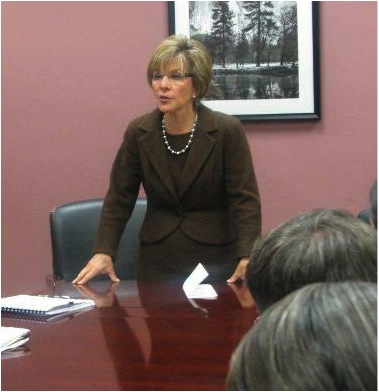Sen. Barbara Boxer's noon press conference started out as a bit of a mess. The Senate press gallery announced it was canceled five minutes before it was due to start. Then three minutes later, the EPW committee sent out a notice that the event had changed locations and would start 20 minutes later. Needless to say, there was much confusion.

When she addressed press members who checked their email in time to get there, Boxer distributed two letters from stakeholders urging Congress to pass a bill or risk millions of jobs.
The first one, from the highway lobby (AAA, AASHTO, the asphalt people, the equipment manfacturers, the contractors, the Highway Users Alliance, and, somewhat incongruously, the American Public Transportation Association) referred to the unemployment numbers released Friday:
While the overall unemployment numbers at 8.3 percent are chilling, the construction industry numbers are much worse at 14.2 percent and showing further job losses. I need not remind you that these are high paying American jobs.
We are deeply concerned about reports that suggest that progress is not being made in conference negotiations that will lead to completion of work by June 30th. We urge that serious action be taken immediately and we are prepared to work with all parties to reach a successful outcome.
The second is from 49 chambers of commerce and business councils around the country. It was less direct in calling Congress on its ineffectiveness but it refers to three similar letters the same coalition has sent Congress, starting last August, and to the nine stop-gap extensions that have prolonged the debate and precluded real action. The signers are clearly concerned about the impending deadline and the need to "invest in our infrastructure, advance mobility and save and create jobs."
They also promote the “America Fast Forward" program, which would expand the TIFIA loan program, giving "state and local agencies the ability to accelerate the financing and construction of local highway & transit projects."
Democratic lawmakers assembled with Boxer evoked their favorite one-liners -- "not letting hard heads get in the way of hard hats" (one of Rep. Rahall's favorites) and the Republican approach of "my way or no highway" (Steny Hoyer is tickled by this one).
Speaking of letters, 33 Democrats on the Sustainable Energy and Environment Coalition in the House sent one last week, urging conferees to reject the three anti-environmental provisions tacked on to the House's extension [PDF]. Specifically, they oppose the Ribble amendment gutting the National Environmental Protection Act (NEPA), the Terry amendment insisting on automatic approval of the Keystone XL pipeline, and the McKinley amendment leaving coal ash regulation to the states.
The pavement lobby letter urges any bill, the business letter urges any bill that leverages public and private dollars, and the SEEC letter urges a bill that does no harm. With just two days left before Boxer's deadline and only 11 more legislative days (for the House) before the drop-dead June 30 deadline, it makes sense that some would urge the passage of a bill, any bill. But at least one of the environmental provisions opposed by the SEEC would kill the bill anyway -- President Obama has promised to veto the transportation bill if it includes the Keystone provision.





